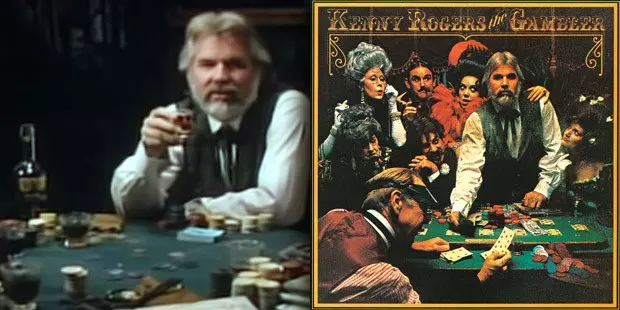“You got to know when to hold ’em, know when to fold ’em.” That’s the online poker player’s mantra, adopted from the classic song “The Gambler.” You surely know the song and maybe you’ve heard it a million times, but there is still more that you might not yet know about “The Gambler.” So let us now take a deep dive into who wrote the song, who sang it, and what it all means.
Who Wrote “The Gambler”?
If you assumed that “The Gambler” was written by Kenny Rogers, you made a reasonable assumption, but you are mistaken. “The Gambler” was actually written by Don Schlitz.
And if you’ve never heard of Don Schlitz, don’t worry, you are not alone. The sad fact is that great songwriters rarely achieve the fame that great singers do, and Don Schlitz never became a household name like Kenny Rogers, but those who need to know, know that he is a great one. He has written hit songs not only for Kenny Rogers but also for Randy Travis, Keith Whitley, Garth Brooks, Mary Chapin Carpenter, and many others, and in recognition of his genius he has been inducted into the Songwriters Hall of Fame and the Country Music Hall of Fame. And the most amazing thing of all is that he wrote “The Gambler”—a song packed with maturity, wisdom, and insight—when he was all of 23 years old.
And Who Sang It?
Kenny Rogers, born in Texas in 1938, is one of the all-time greats of country music. He has had a long and illustrious career with many hit songs, many sold-out shows, and millions of devoted fans. And at the peak of it all stands “The Gambler.”
Kenny Rogers was neither the first to sing “The Gambler” (that was Bobby Bare in 1976) nor the last, but it is his version, recorded in 1978, that is recognized as the classic. It was just one of those magic moments when the right singer and the right song come together at just the right time to produce a work of enduring artistic perfection. The result is symbiotic immortality:
- “The Gambler” will always be known as a Kenny Rogers song
- Kenny Rogers will always be known as “The Gambler.”
And that is as it should be.
And What’s It About?
“The Gambler” tells the story of a chance encounter, on “a train bound for nowhere” (Could this be the train of life? On a journey to the ultimate oblivion of the graveyard?), between the narrator (the “I” of the song) and a man referred to simply as “the gambler” The gambler, who has made a career of “reading people’s faces” at the poker table, now reads the narrator’s face and can see that he is “out of aces.” In exchange for a sip of whiskey and a cigarette, he then gives the narrator this advice:
“You got to know when to hold ’em, know when to fold ’em,
Know when to walk away and know when to run.
You never count your money when you're sitting at the table.
There’ll be time enough for counting when the dealings done.
Now every gambler knows that the secret to surviving
Is knowing what to throw away and knowing what to keep.
’Cause every hand’s a winner and every hand’s a loser,
And the best that you can hope for is to die in your sleep.”
And with that, the gambler falls asleep and—the song implies without explicitly stating—dies. But the narrator appreciates that in the gambler’s final words he, the narrator, has received something of great value: “an ace that I could keep.”
Know When to Hold ’Em
The gambler’s advice is phrased in the jargon of a poker game but the value of the advice—and the beauty of the song—is that it is applicable to every aspect of life. Whether we are talking about playing poker online or about our material possessions, our careers, our relationships, our hopes and dreams and regrets and disappointments, we’ve always got to know when to hold ’em, know when to fold ’em, know what to throw away, and know what to keep. Sage advice that is well worth the price of a sip of whiskey and a cigarette.
Good luck at the poker tables and good luck on the train ride of life, wherever it may take you!

